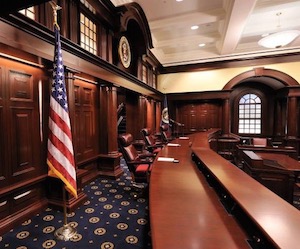Each week, we succinctly summarize the preceding week of Federal Circuit precedential patent opinions. We provide the pertinent facts, issues, and holdings. Our Review allows you to keep abreast of the Federal Circuit’s activities – important for everyone concerned with intellectual property. We welcome any feedback you may provide.
– Joe Robinson, Bob Schaffer, Lindsay Henner, Parker Hancock, and Puja Dave
81-3. Court Did Not Abuse Its Discretion To Allow Defendant’s § 101 Defense After Alice; Claims for “Anonymous Load Shopping” Using Generic Computer Technology Are Abstract And Unpatentable.
Mortg. Grader, Inc. v. First Choice Loan Servs., No. 2015-1415, 2016 U.S. App. LEXIS 1115 (Fed. Cir. January 20, 2016) (Before Taranto, O’Malley, and Stark, DJ.) (Opinion for the court, Stark, DJ.). Click Here for a copy of the opinion.
Mortgage Grader, Inc. sued First Choice Loan Services for infringement of a patent which claimed a computer-implemented system allowing consumers to shop for loan packages, such as mortgages. When the defendant answered the complaint, they included a defense that the claims were invalid form claiming subject matter ineligible for patenting under 35 U.S.C. §101. The defendant omitted that defense from its initial invalidity contentions, and re-asserted it in the final invalidity contentions.
These contentions were served under the Judge’s Standing Patent Rules (SPR), which model the local patent rules adopted by many jurisdictions. The SPR requires that defendants file final invalidity contentions following the issuance of a claim construction order. The defendant may make limited changes to the final contentions, such as changes necessary to the court’s claim construction or arising from recently discovered evidence. Otherwise, the defendant must show good cause for changing its invalidity contentions.
Here, the plaintiff moved to strike the re-asserted invalidity defense under §101 as not made with good cause and as unfairly prejudicial. The defendant argued that the change was made in view of the Supreme Court’s §101 decision in Alice v. CLS Bank, which was decided two months before the final invalidity contentions were served. The district court agreed that the Alice decision was sufficient cause to re-assert the §101 defense in the final invalidity contentions. The district court later granted summary judgment of invalidity under §101. The plaintiff appealed.
 The Court first reviewed the district court’s decision not to strike the §101 defense in the defendant’s final invalidity contentions. The Court recognized that the SPR is a reasonable tool for the district court to control its own docket, and reviewed the decision under the SPR for an abuse of discretion. The Court held that there was no abuse of discretion, because Alice made a significant change in the law, particularly for claims that involve “implementations of economic arrangements using generic computer technology.” To illustrate this change, the Court pointed to the Ultramerical decisions. There, the Court affirmed its reversal of a district court’s finding of invalidity under § 101 after its prior decision was vacated by the Supreme Court for reconsideration in view of Mayo. However, when the decision was again vacated by the Supreme Court for reconsideration in view of Alice, the Court affirmed the district court’s finding of invalidity. Thus, the defendant may have reasonably believed it had no defense under § 101 prior to Alice, but believed it did have a defense by following Alice.
The Court first reviewed the district court’s decision not to strike the §101 defense in the defendant’s final invalidity contentions. The Court recognized that the SPR is a reasonable tool for the district court to control its own docket, and reviewed the decision under the SPR for an abuse of discretion. The Court held that there was no abuse of discretion, because Alice made a significant change in the law, particularly for claims that involve “implementations of economic arrangements using generic computer technology.” To illustrate this change, the Court pointed to the Ultramerical decisions. There, the Court affirmed its reversal of a district court’s finding of invalidity under § 101 after its prior decision was vacated by the Supreme Court for reconsideration in view of Mayo. However, when the decision was again vacated by the Supreme Court for reconsideration in view of Alice, the Court affirmed the district court’s finding of invalidity. Thus, the defendant may have reasonably believed it had no defense under § 101 prior to Alice, but believed it did have a defense by following Alice.
The Court then reviewed the district court’s decision to grant summary judgment of invalidity under §101. Here, like in Alice, the claims were directed towards an abstract economic idea, and recited only generic computer technology. Specifically, the claims recited the abstract idea of “anonymous loan shopping.” Beyond that abstract idea, the claims only added generic computer components such as an “interface,” “network,” and “database,” none of which provided an inventive concept to render the claims patent-eligible. For these reasons, the Court affirmed the district court’s grant of summary judgment of invalidity.
EDITORIAL NOTE: The patents in suit were U.S. Patent Nos. 7,366,694 and 7,680,728.

![[IPWatchdog Logo]](https://ipwatchdog.com/wp-content/themes/IPWatchdog%20-%202023/assets/images/temp/logo-small@2x.png)



![[Advertisement]](https://ipwatchdog.com/wp-content/uploads/2024/04/UnitedLex-May-2-2024-sidebar-700x500-1.jpg)
![[Advertisement]](https://ipwatchdog.com/wp-content/uploads/2024/04/Artificial-Intelligence-2024-REPLAY-sidebar-700x500-corrected.jpg)
![[Advertisement]](https://ipwatchdog.com/wp-content/uploads/2024/04/Patent-Litigation-Masters-2024-sidebar-700x500-1.jpg)

![[Advertisement]](https://ipwatchdog.com/wp-content/uploads/2021/12/WEBINAR-336-x-280-px.png)
![[Advertisement]](https://ipwatchdog.com/wp-content/uploads/2021/12/2021-Patent-Practice-on-Demand-recorded-Feb-2021-336-x-280.jpg)
![[Advertisement]](https://ipwatchdog.com/wp-content/uploads/2021/12/Ad-4-The-Invent-Patent-System™.png)






Join the Discussion
No comments yet.